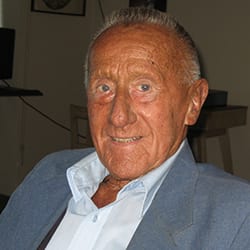News
Celebrating the Life of Karl Maramorosch
 Faculty and staff of the Boyce Thompson Institute are saddened to announce the passing of Karl Maramorosch, a former faculty member and distinguished virologist, entomologist and plant pathologist.
Faculty and staff of the Boyce Thompson Institute are saddened to announce the passing of Karl Maramorosch, a former faculty member and distinguished virologist, entomologist and plant pathologist.
Maramorosch died May 9 in Poland while visiting family. He was 101 years old.
As a pioneer in plant pathology and insect tissue culture, he provided the first evidence that plant pathogens can replicate within insects, using aster yellows disease, and developed insect cell culture techniques for growing viruses. Our understanding of a variety of plant pathogens has been vastly expanded by his work. In 1980 Maramorosch was awarded the Wolf Prize in Agriculture for “his pioneering and wide-ranging studies on interactions between insects and disease agents in plants.”
“Karl moved from Rockefeller University to the Boyce Thompson Institute in 1961 where he made his most important contributions,” wrote Randy Gaugler, director of The Center for Vector Biology at Rutgers University, in Maramorosch’s obituary. “As Program Director of Virology, he and his coworkers were at the forefront of new and fascinating studies using the electron microscope to detect and characterize viruses and phytoplasmas in cells of diseased plants and insect vectors.”
When the institute moved to the Cornell University campus in 1974, he stayed in the New York City area and accepted a position at the Waksman Institute of Microbiology at Rutgers University, later moving to the entomology department.
As a professor emeritus, Maramorosch continued writing and editing throughout his life. He wrote more than 800 research papers and edited more than 90 volumes on invertebrate cell culture, plant diseases and insect vectors.
Maramorosch will be remembered fondly by the many colleagues and friends with whom he worked throughout his long career. The impact of his work at BTI and elsewhere has left an indelible mark on the fields of plant and invertebrate pathology. Apart from being a talented scientist, Maramorosch was a gifted pianist, spoke numerous languages and escaped the Holocaust with his wife Irene. He is survived by his daughter, Lydia Ann Trammell Maramorosch.
Learn more about Maramorosch’s long life and distinguished career in a previous news article.
Subscribe to BTI's LabNotes Newsletter!
Contact:
Boyce Thompson Institute
533 Tower Rd.
Ithaca, NY 14853
607.254.1234
contact@btiscience.org
Copyright © 2023 | Boyce Thompson Institute | All rights reserved | Privacy Policy | Cookie Policy


